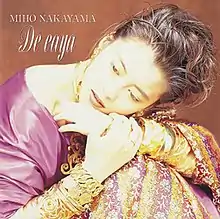| Dé eaya | ||||
|---|---|---|---|---|
 | ||||
| Studio album by | ||||
| Released | March 15, 1991 | |||
| Recorded | 1990 | |||
| Studio |
| |||
| Genre | ||||
| Length | 54:11 | |||
| Language | Japanese | |||
| Label | King Records | |||
| Producer | Akira Fukuzumi | |||
| Miho Nakayama chronology | ||||
| ||||
Dé eaya (デ・イーヤ, De īya) is the 13th studio album by Japanese entertainer Miho Nakayama. Released through King Records on March 15, 1991, it is Nakayama's fourth studio release (after One and Only, Mind Game, and Merry Merry) to not feature a single. The album's title is derived from the Japanese word "De iiya" (でいいや, "No"), but stylized to sound Spanish to match the Latin music motif of the album.[1][2][3]
The album peaked at No. 2 on Oricon's albums chart and sold over 125,000 copies.[4][5]
Track listing
All lyrics are written by Miho Nakayama, except where indicated; all music is arranged by ATOM, except where indicated.
| No. | Title | Lyrics | Music | Arrangement | Length |
|---|---|---|---|---|---|
| 1. | "Melody" (Merodī (メロディー)) | Taeko Onuki |
|
| 3:48 |
| 2. | "Mana" | Chika Ueda | Yoshimasa Inoue | 4:14 | |
| 3. | "Crazy Moon" | Onuki | Onuki | 4:18 | |
| 4. | "Joker" | Y. Inoue | 6:03 | ||
| 5. | "Paradio" | Ueda | 4:53 | ||
| 6. | "Gray" | Ueda |
| 6:02 | |
| 7. | "Bingo" | Y. Inoue | Y. Inoue | 6:05 | |
| 8. | "Flash Back" | Ueda |
| 5:14 | |
| 9. | "Cockatoo" | Masaya Ozeki | 4:11 | ||
| 10. | "Hitorigoto" ((ひとりごと, "Soliloquy")) | Onuki | 4:45 | ||
| 11. | "Special Ever Happened" | Chinfa Kan | Hiroshi Narumi | Narumi | 4:38 |
| Total length: | 54:11 | ||||
Personnel
- Miho Nakayama – vocals
- Chuei Yoshikawa – guitar (1)
- Yuzō Hayashi – keyboards (1)
- Nittoku Inoue – keyboards (6, 8)
- Hiroshi Narumi – keyboards (11)
- Shuichi "Ponta" Murakami – drums (6)
- Xácara – percussion (2)
- Saito Takeshi Group – strings (1)
- Jake Concepcion – saxophone (8)
- Shin Kazuhara – flugelhorn (4, 6)
- Nobuo Yagi – mouth harp (9)
- Jacky – backing vocals (2, 5)
- Kazumi Miyaura – backing vocals (2, 5)
- Junko Hirotani – backing vocals (8)
- Yuka Satō – backing vocals (9)
Charts
| Chart (1991) | Peak position |
|---|---|
| Japanese Albums (Oricon)[4] | 2 |
References
- ↑ "中山美穂". Idol.ne.jp. 28 December 2018. Retrieved 2021-08-06.
- ↑ "中山美穂 / De eaya [廃盤]". CDJournal. Retrieved 2021-08-05.
- ↑ "De eaya~デイーヤ | 中山美穂". Mora. Retrieved 2021-08-06.
- 1 2 "De eaya. | 中山美穂". Oricon. Retrieved 2021-08-06.
- ↑ "中山美穂". Yamachan Land (in Japanese). Archived from the original on 2011-08-14. Retrieved 2021-08-06.
External links
- Official website
- Dé eaya at MusicBrainz (list of releases)
- Dé eaya at Discogs
This article is issued from Wikipedia. The text is licensed under Creative Commons - Attribution - Sharealike. Additional terms may apply for the media files.